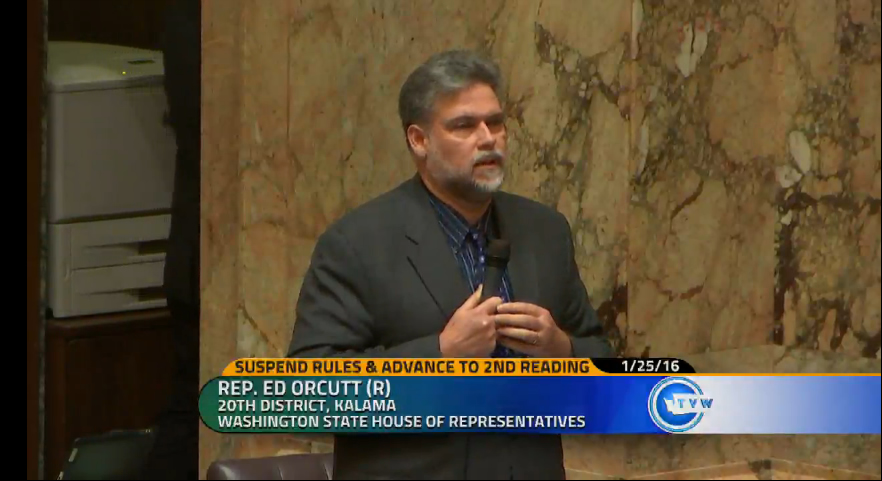This morning, just prior to the House of Representatives’ adjournment for the day, Republican State Representative Ed Orcutt of Kalama attempted to fast-track a resolution that would amend the Washington State Constitution to require a two-thirds vote to raise or recover any revenue, as fervently desired and demanded by Mukilteo-based initiative profiteer Tim Eyman.
Rising during the fourth order of business, after the House had adopted 2SHB 1737, Orcutt (R‑20th District) moved to suspend House rules and advance his HJR 4215 to second reading, which would mean bypassing the committee process altogether. Orcutt then proceeded to deliver a speech in favor of his motion, in which he recited several of Tim Eyman’s favorite talking points.
House Majority Leader Pat Sullivan (D‑47th District) rose in response, and urged a no vote, noting that the committee process is where bills and resolutions alike go to be discussed, amended, and refined. Initiatives like Tim Eyman’s unconstitutional I‑1366, Sullivan noted, do not go through the Legislature’s deliberative committee process, which essentially serves as a filter to weed out legislation that is poorly crafted, not ready for primetime, or simply a bad idea to begin with.
The House then voted forty-eight to forty-nine not to adopt Orcutt’s motion.
“Having failed to receive the necessary two-thirds vote, your motion fails,” House Speaker Pro Tem Jim Moeller declared to Orcutt and the House as a whole.
Orcutt’s resolution was then referred to House Finance without objection.
The roll call vote hasn’t been posted, but it looks like it was a party-line vote. The House has fifty Democratic members, and one of them was excused at the time of the vote. The Republican caucus currently consists of forty-eight members.
No doubt Republicans planned this vote as a test to see if any Democrats would capitulate, and to compile attack fodder for the coming 2016 elections.
Kudos to the Democrats for sticking together and standing up to this nonsense. If our cherished tradition of majority rule is to survive, it must be defended.
Article II, Section 22 of our Constitution says that bills pass by majority vote. That means fifty of ninety-eight in the House and and twenty-five of forty-nine in the Senate must vote aye. No more, and no less.
This provision of our Constitution dates back to statehood. To sabotage it now would upset the balance of majority rule and minority rights that our Founders entrusted to us. It would be a terrible thing to do.
Shame on Ed Orcutt and his Republican colleagues for attempting to subvert majority rule. They should remember what happened last year in the Senate, when Republicans set themselves up for failure by unwisely changing Senate rules to require a two-thirds vote to advance certain revenue bills… only to find themselves impeded by their own rules change a few weeks later when they wanted to pass a transportation revenue bill. (Happily, Lieutenant Governor Brad Owen came to their rescue and struck down their two-thirds scheme.)
If Republicans ever get the majority back in the House, they’re going to want to be able to pass bills and budgets on their own, without Democrats being able to veto their every move. They should be more proactive with their imaginations and contemplate the shoe being on the other foot.
Majority rule is good for Democrats and Republicans alike. This truth is something that the elder statesmen of their party — people like Sam Reed, Ralph Munro, and Dan Evans — understand. Why don’t Orcutt and his colleagues get it?

